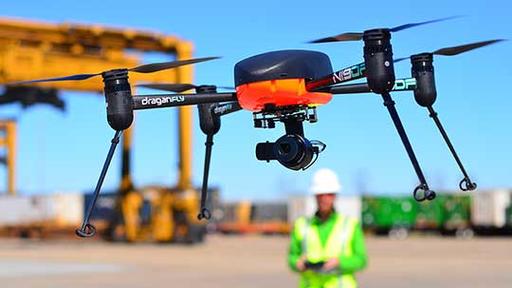Draganfly (DFLY.C) and Integrated Launcher Solution (ILS) inked a contract today wherein DFLY would help ILS build a product line integrating their drones with ILS’s drone-based non-lethal multi-launching system.
The notion of weaponized drones (and other robots) was a staple of science fiction since long before said genre was a mote floating in the eye of some publishing marketing exec, which is to say that it predates modern marketing. It earmarks some of humanity’s deepest anxieties about technology getting away from us, and enters into the full blown realm of simulacra horror. Think: Terminator, think Frankenstein, think—well, you get the idea.
And then there’s the flipside of the coin: Robocop. No, not the dunderheaded remake with Joel Kinnaman, but the original Paul Verhoeven directed action-classic from the 80’s, which managed to sneak in a thinly veiled critique of the relationship of power to technology, wrapped in a story about a cybernetic cop that blows away

badguys. Find it on whatever streaming service and rewatch it with a critical eye—it’s a little silly in that good way movies from the 80’s often were—but the stealth message is there.
But there’s a dark-side to this argument (that honestly, only the remake truly captures) and that’s that we’re perfectly fine when the weaponized drones and other extensions of our will to dominate are used against the other. And by the other, we mean them: the enemy. Whoever they may be at the time. But it’s a different story when they make appearances in our neighbourhoods, watching us from above. There’s a historical precedent for this behaviour as well:
“We prohibit under anathema that murderous art of crossbowmen and archers, which is hateful to God, to be employed against Christians and Catholics from now on.” The Second Lateran Council – 1139 AD. (Muslims, subsequently, were fine and even encouraged as crossbow targets.)
As it turns out, back in the 21st century, the modern day Catholics aren’t fond of what’s been called killer robots, either, and it’s caused something of a groundswell of activism in its wake.
Let’s also point out, we have problems with flesh and blood cops kneeling on necks, but at least they have names and faces and narratives. Even if you accept that Derek Chauvin was propped up as a scapegoat for the racial violence endemic to North American policing (and I do, for the record) there is still the potential for change. If (and when) something involving a drone occurs, there’s plausible deniability in distance, for example, an appeal to a “drone malfunction” or a “hack” to defer responsibility. Or worse—policing as been left to the algorithms.
But maybe we’re getting ahead of ourselves here?
There’s an argument that the spate of police-related murders in the United States are due to lack of training and on the job stress rates. By removing the police officer to a cozy desk miles away where they can handle late night traffic stops remotely, or disperse an unruly crowd using a fleet of black chrome drones firing non-lethal subsonic nerf missiles, could have a beneficial effect.
They’re already present in Chicago, Israel and India, to name three very disparate places.
Right now, DFLY and ILS are only working on a prototype to fit less than lethal 40 mm multi-launching armament on drones, drone systems, robots, robotic systems and other platforms for public disturbance management for military and public safety organizations. So more nerf missiles than traffic stops—but we know what’s next. Cops aren’t cheap in either time spent training them, arming them, pensioning them off, public relations, etc, and if costs can be cut through mechanization, then they will be.
It’s been said that the only jobs remaining in twenty years will be zumba teachers, priests and psychiatrists. And then again, maybe not priests. Granted, they’ve been saying that for decades, but as futurist and science-fiction legend William Gibson has famously said: “The future is already here. It’s just not evenly distributed yet.”
Regardless, here’s a use-case for a 40 mm less than lethal option:
https://www.youtube.com/watch?v=wPmdBMgSu08
If you’re an investor looking to get in on the future, you don’t have to look much further.
Draganfly has provided ILS with a strategic vendor financing of US$150,000 to help develop the project and in response, ILS has given DFLY a worldwide royalty of 8% of the revenue from said project for five years from either the repayment date, or the maturity of the loan.

Draganfly is down five cents today, and trading presently at $1.58.
—Joseph Morton







